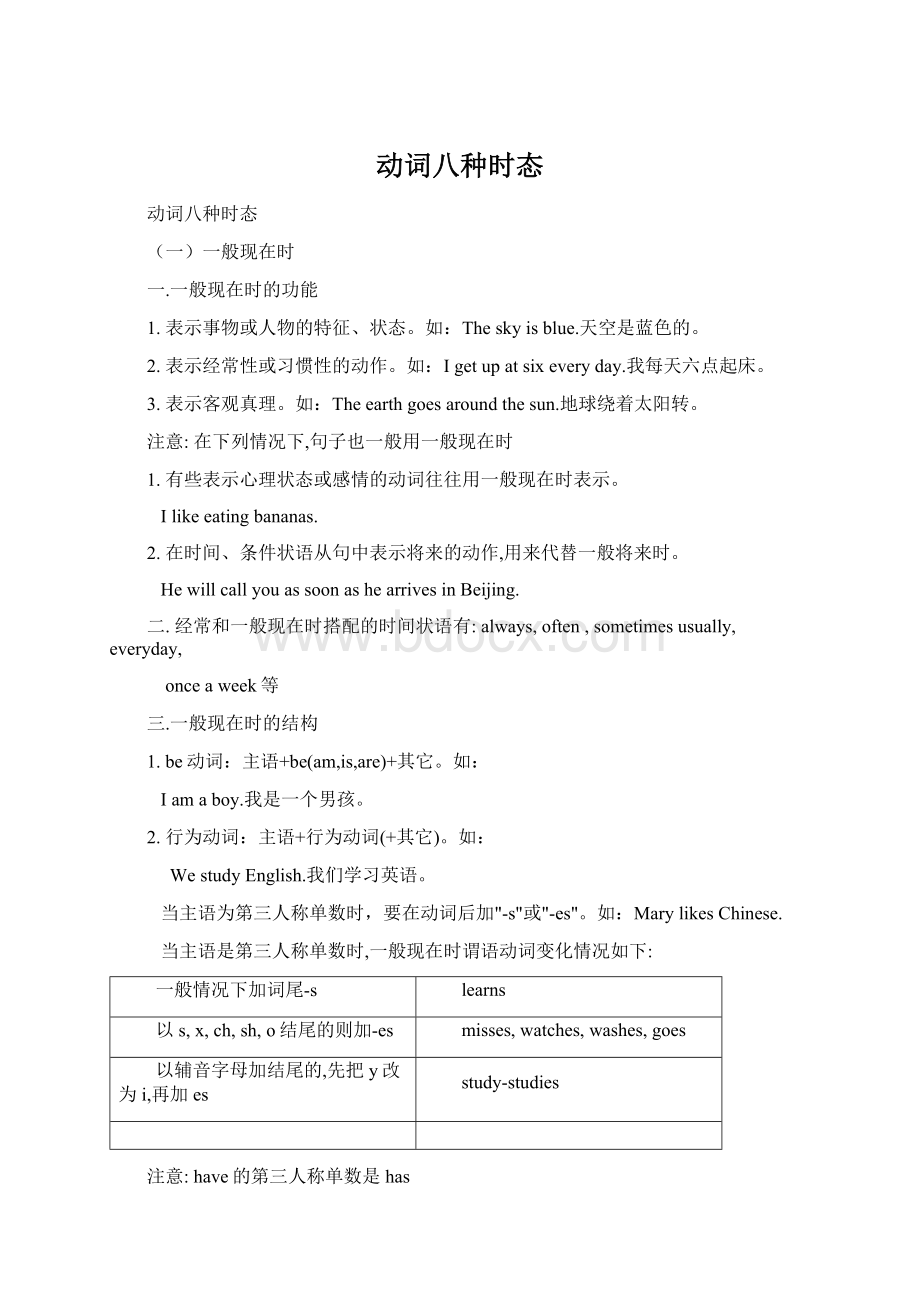动词八种时态.docx
《动词八种时态.docx》由会员分享,可在线阅读,更多相关《动词八种时态.docx(18页珍藏版)》请在冰豆网上搜索。

动词八种时态
动词八种时态
(一)一般现在时
一.一般现在时的功能
1.表示事物或人物的特征、状态。
如:
Theskyisblue.天空是蓝色的。
2.表示经常性或习惯性的动作。
如:
Igetupatsixeveryday.我每天六点起床。
3.表示客观真理。
如:
Theearthgoesaroundthesun.地球绕着太阳转。
注意:
在下列情况下,句子也一般用一般现在时
1.有些表示心理状态或感情的动词往往用一般现在时表示。
Ilikeeatingbananas.
2.在时间、条件状语从句中表示将来的动作,用来代替一般将来时。
HewillcallyouassoonashearrivesinBeijing.
二.经常和一般现在时搭配的时间状语有:
always,often,sometimesusually,everyday,
onceaweek等
三.一般现在时的结构
1.be动词:
主语+be(am,is,are)+其它。
如:
Iamaboy.我是一个男孩。
2.行为动词:
主语+行为动词(+其它)。
如:
WestudyEnglish.我们学习英语。
当主语为第三人称单数时,要在动词后加"-s"或"-es"。
如:
MarylikesChinese.
当主语是第三人称单数时,一般现在时谓语动词变化情况如下:
一般情况下加词尾-s
learns
以s,x,ch,sh,o结尾的则加-es
misses,watches,washes,goes
以辅音字母加结尾的,先把y改为i,再加es
study-studies
注意:
have的第三人称单数是has
四.一般现在时的否定和疑问结构
1.否定句
be动词 主语+be+not+其它。
Heisnotaworker.
行为动词 主语+don't(doesn't)+动词原形(+其它)。
Idon'tlikebread.
当主语为第三人称单数时,要用doesn't构成否定句。
Hedoesn'toftenplayfootball.
2.一般疑问句
be动词 Be+主语+其它。
-Areyouastudent?
-Yes.Iam./No,I'mnot.
行为动词 Do(Does)+主语+动词原形+其它。
-Doyouoftenplayfootball?
-Yes,Ido./No,Idon't.
当主语为第三人称单数时,要用does构成一般疑问句。
-Doesshegotoworkbybike?
-Yes,shedoes./No,shedoesn't.
3.特殊疑问句 疑问词+一般疑问句。
Whereismybike?
EXERCISES:
1.Thelittleboy (study)veryhard.
2.Mysisters (water)theflowerseveryday.
3.Lucy (go)toschoolbybike.
4.He (not,like)swimmingatall.
5.Ourschool (not,be)verybig,butitisverybeautiful.
6.Motheralways (worry)aboutmyfather’shealth.
7.Sometimesmyfather (take)metotheparktoflykitesonSunday.
8.MissSmith (teach)usEnglishinourschool.
9.Myparents (not,be)bothteacher.
10.Thetwins (live)onthesecondfloor.
11.MrBrownoften (watch)TVintheafternoon.
12.Lucyoften (have)lunchatschool
13.I (not,speak)Chinese
14.TomandJimusually (write)tome.
15.Myfriend (play)basketballonceaweek.
(二) 现在进行时
一.现在进行时的用法
表示当前一段时间或现阶段正在进行的动作
Heiswritingaletter.
Wearemakingmodelplanesthesedays.这些天我们在做飞机模型。
二.经常和现在进行时搭配的单词有 now,listen,look(at),atthemoment
三.现在进行时的结构
现在进行时由"be+v-ing"构成
Iamreading.
Heisreading.
Wearereading.
EXERCISES:
1.We (play)basketontheplaygroundnow.
2.He (have)lunchatschoolnow.
3.Listen!
Thebirds (sing)inthetree.
4.Look!
Thelittlegirl (dance)dance.
5.TomandJack (play)gamesatthemoment.
6.Look!
Thechildren (have)agoodtimeoverthere.
7.It’sfinetoday.Thesun (shine).
8.Thestudents (do)theirhomeworkintheclassroomnow.
9.Look!
Thechild (sit)ontheball.
10.Theforeigner (talk)withourheadmasternow.
11.Mybrother (listen)tothemusicatthemoment.
12.Listen!
Thebirds (sing)inthetree.
13.Whatishedoing?
He (wash)hisclothes?
14.Lookatthegirl!
What she (draw)ontheblackboard?
15.Bequick!
They (wait)usoutsidethegateoftheschool.
(三)一般将来时
一.一般将来时的用法
一般将来时表示将来发生的动作或状态
二.常用于一般将来时的时间状语有 soon,nextweek,tomorrow
三.一般将来时的结构
1.will/shall+动词原形 shall用于第一人称,常被will所代替
LucywillstudyChinesenextyear.
2.begoingto+动词原形 1)表示按计划要做的事
Wearegoingtothefarmtomorrow.
2)表示很快就要发生的事
Look!
Thereismuchdarkcloud.Itisgoingtorainsoon.
Thewomanisgoingtohaveababy.
EXERCISES:
1.Saysomethingaboutwhatyou (do)tomorrow.
2.We (help)thefarmersgrowricenextweek.
3.Thebus (take)youtothemuseum.
4.TeacherLi (give)atalkonman-madesatellitenextSaturday.
5.We (hold)asportsmeetingnextSaturday.
(四)一般过去时
一.一般过去时的用法
一般过去时表示过去发生的动作或状态。
Wewenttotheparkyesterday.
二.常与一般过去时搭配的时间状语有:
yesterday,lastyear,tenyearsago,in1989,justnow
三.一般过去时的结构
1.be动词:
主语+be(was,were)+其它。
如:
Iwasateachertenyearsago.
2.行为动词:
主语+行为动词的过去式(+其它)。
如:
WestudiedEnglish.我们学习英语。
注意:
规则动词的过去式的变化情况如下:
一般情况下在加词尾-ed
learn-learned
以e结尾的则加-d
write-writed
以辅音字母+y结尾的,先把y改为i,再加-ed
study-studied
不规则动词的过去式的变化情况可以参照教课书后面的表格
四.一般过去时的否定句和疑问句
1.否定句
be动词 主语+was/were+not+其它。
Hewasnotaworker.
行为动词 主语+didn't+动词原形(+其它)。
Ididn'tgototheparkyesterday.
2.一般疑问句
be动词 was/were+主语+其它。
-Washeastudentlastyear?
-Yes,hewas./No,hewasn't.
行为动词 Did+主语+动词原形+其它。
-Didyou playfootballjustnow?
-Yes,Idid./No,Ididn't.
3.特殊疑问句 疑问词+一般疑问句。
Howdidyourfathergotoworkyesterday?
(五)现在完成时
一.现在完成时的定义:
1.表示过去发生的事对现在造成了影响
Ihaveopenedthedoor.(Thedoorisstillopennow)
2.过去某个动作一直延续到现在
Ithasrainedforaweek.(Itbegantorainaweekago,anditisstillraining.)
IhavelivedinChinaforten years.
二.常与现在完成时搭配的单词有
already,yet,since,for---,just,---before,in/duringthepast+一段时间,never,ever
三.现在完成时的结构:
have/has+动词的过去分词
Ihavehadbreakfast.
Hehasfinishedhishomework.
注意:
现在完成时的否定句是在have(has)的后面加上not,疑问句是将have(has)置于主语之前。
否定句:
Ihavenotseenthemovieyet.我还没看这部电影。
Hehasn'tbeentoBeijingsincethen.从那时起,他就再也没来过北京。
一般疑问句:
Have(Has)+主语+过去分词~?
Haveyoufinishedthework?
你已经做完这项工作了吗?
Yes,Ihave./No,Ihaven't.
Hasshearrivedhere?
她已经到这儿了吗?
Yes,shehas/No,shehasn't
特殊疑问句句型 特殊疑问词+have(has)+主语+过去分词~?
HowmanytimeshaveyoubeentotheGreatWall?
一般过去时和现在完成时的区别:
现在完成时表示过去发生的某一动作对现在造成的影响或结果,强调的是现在的情况,所以它不能和表示过去的时间状语连用。
Ihaveopenedthedoor.
一般过去时只表示过去的动作或状态,和现在不发生关系,它可以和表示过去的时间状语连用。
Iopenedthedoorthismorning.
试比较下列句子:
现在完成时节 一般过去时
1.Ihavedroppedmypen. Idroppedmypenjustnow.
2..Shehascome. Shecameherejustnow.
3.Ihavelostmywatch. Ilostmywatchlastweek.
4.Ihavehadbreakfast.Iamfullnow. Ihadbreakfastat7:
00
5.Hehascleanedhisroom,itiscleannow. Hecleanedhisroom,butitisdirtynow.
一般过去时、现在完成时的专项练习题
1.I thecake,Iamfullnow.(eat)
2.I thecakelastnight. (eat)
3.He thefilmtenyearsago.(see)
4.I anewbookyesterday.(buy)
5.She herbook,shecan’tfinditanywhere.(lose)
6.Mother supper,wecanhaveanicemeal.(cook)
7.She herclothesthismorning.(wash)
8.I lunchat12:
10.(have)
9.I myhomeworkjustnow.(do)
10.I yourshoes,youcanputthemonnow.(clean)
11.He (tell)ussomethingaboutAmericayesterday.
12.Tom (make)somemistakesinhistest.
13.Thetrainhasalready (arrive).
14.Jane (send)meadictionarythedaybeforeyesterday.
15.They (ask)metothankyourmotherjustnow.
16.Thedoctor (say)thechildneededanoperation.
17.Thedog (die)twohoursago.
18.Tomorrowismyfather’sbirthday.I (buy)apresentforhim.
19.Maryisn’tintheclassroom. She herhomeworkyet?
(finish)
20. you (find)thekeyofyourhouse?
现在完成时的瞬间动词与与连续性动词
瞬间动词 延续性动词
die bedead
open(动词) beopen(形容词)
close(动词) beclosed(形容词)
getup beup
fallasleep beasleep
finish beover
leave beaway
start/begin beon
buy have
borrow keep
catchacold haveacold
join
(1)bea+成员;职业
(2)bein+集团;组织;单位
come/go/arrive/get/catch
(1)be+副词
(2)bein/at+名词
EXERCISES:
1.Hecameherethreeyearsago.
He here forthreeyears.
2.Schoolfinishedamonthago.
School foramonth.
3.Heborrowedthisbookaweekago.
He thisbookforaweek.
4.Thefactoryopenedtenyearsago.
Thefactory for10years
5.Themanjoinedthearmytwoyearsago.
Theman asoldiersincetwoyearsago.
6.HearrivedinBeijinglastyear.
He Beijingsinceayearago.
7.